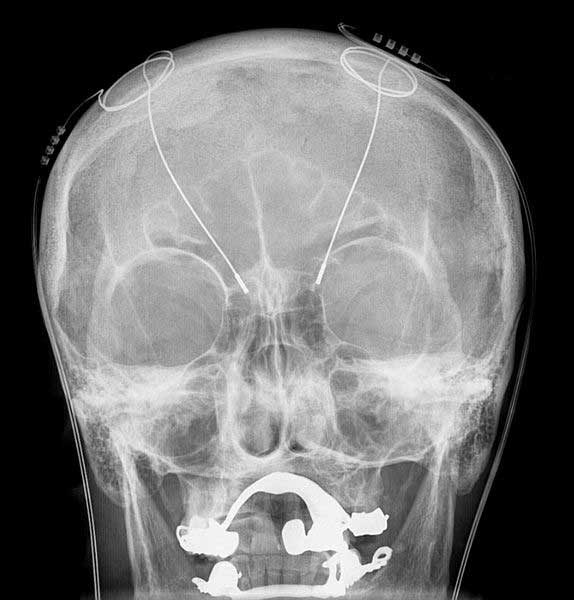Many adults, regardless of their weight, resolve to avoid fatty foods and unhealthy desserts. But despite one’s best intentions, when the moment for decision comes, that chocolate lava cake is often too enticing and self-control vanishes.
This behavior is normal because hunger increases the intensity of food rewards. Yet, individuals with anorexia nervosa (AN), despite their state of starvation, are able to ignore such food-related rewards.
A new study by Dr. Christina Wierenga, Dr. Walter Kaye, and colleagues, published in the current issue of Biological Psychiatry, sheds new light on the brain mechanisms that may contribute to the disturbed eating patterns of anorexia.
They examined reward responding in relation to metabolic state (hungry or satiated) in 23 women recovered from AN and 17 healthy women without eating disorder histories (e.g., the comparison group). Women with active AN weren’t studied to reduce potential confounds related to starvation.
The healthy women, when in a state of hunger, showed increased activity in the part of the brain that motivates the seeking of reward, but the women recovered from AN did not. The recovered women also exhibited increased activation of cognitive control circuitry regardless of metabolic state.
Thus, this study found that women who have recovered from anorexia nervosa show two related patterns of changes in brain circuit function that may contribute to their capacity to sustain their avoidance of food.
First, hunger does not increase the engagement of reward and motivation circuits in the brain. This may protect people with anorexia from hunger-related urges. Second, they showed increased activation of executive ‘self-control’ circuits in the brain, perhaps making them more effective in resisting temptations.
“This study supports the idea that anorexia nervosa is a neurobiologically-based disorder. We’ve long been puzzled by the fact that individuals with AN can restrict food even when starved. Hunger is a motivating drive and makes rewards more enticing,” said Wierenga, an Associate Professor of Psychiatry at the University of California, San Diego. “These findings suggest that AN individuals, even after recovery, are less sensitive to reward and the motivational drive of hunger. In other words, hunger does not motivate them to eat.”
“This study offers new insights about the brain in AN, which we are using to guide treatment development efforts, and reduce stigma associated with this life-threatening disorder,” added Kaye, who is a Professor of Psychiatry and Director of the Eating Disorder Program at UCSD.
“Anorexia nervosa is a devastating illness and this study sheds new light on brain mechanisms that may enable people to starve themselves. In identifying these mechanisms, this work may provide circuit-based targets for therapeutics,” commented Dr. John Krystal, Editor of Biological Psychiatry. “But these same circuits and processes seem to be engaged ‘in reverse’ for obesity. Thus, this study may have broad implications for the country’s obesity epidemic as well.”


Women with eating disorders tend to be perfectionistic, eager to please others, sensitive to criticism, and self-doubting. They often have difficulty adapting to change and are future- oriented.
A smaller group of patients with eating disorders have a more extroverted temperament and are often novelty-seeking and impulsive with difficulty to maintain stable relationships.
Duration varies:
Some people with anorexia nervosa have a single, relatively brief episode after experiencing an isolated stressful event. For others, the problem becomes chronic and the person’s condition gradually deteriorates.
Are certian personality traits more commen in individuals with eating disorders such as anorexia nervosa? And is there an expected duration?
Obese people often show dampened activity in the brain’s reward centres after eating, but it has long been unclear what role dopamine plays in it. And no one has looked into how exactly the brain reacts in the opposite eating disorder, Anorexia. Until Guido Frank of the University of Colorado, Denver, set out to address both questions at once. He has just reported his findings in Neuropsychopharmacology. By looking at which regions of the brain display a similar firing pattern when presented with like stimuli, researchers have been able to pin down human brain’s dopamine centres. These are, as it happens, precisely the ones which were overactive in anorexic women and lethargic in obese ones. Moreover, they were overactive in just the way the model predicts, suggesting that dopamine is indeed directly involved.
according to the articles I read ,It is not yet clear whether dopamine levels are a cause of disordered eating or an effect of it. Some study’s state that Several weeks of overfeeding is enough to turn rodent brains’ dopamine centres torpid, like those of the obese women. Conversely, brains of starved rodents come to resemble the anorexics’. antipsychotic drugs which target the dopamine system have so far failed to live up to their promise in treating eating disorders.
Does too much dopamine cause anorexia? Or too little? Or is it that anorexics have normal levels of dopamine, but too many receptors? All the articles and abstracts I’m reading are using too much scientific jargon, I’m not smart enough to fully understand that.
Also, would taking “dopamine supplements” cause anorexia, or would they just reduce receptor sensitivity, hence leading to some type of (similarly negative yet at the same time) opposite effect?
So does this mean that an anorexic persons brain suppresses the secretion of Dopamine?